Keto Weight Gain Causes & Solutions [Quick Keto Hunger Hacks]
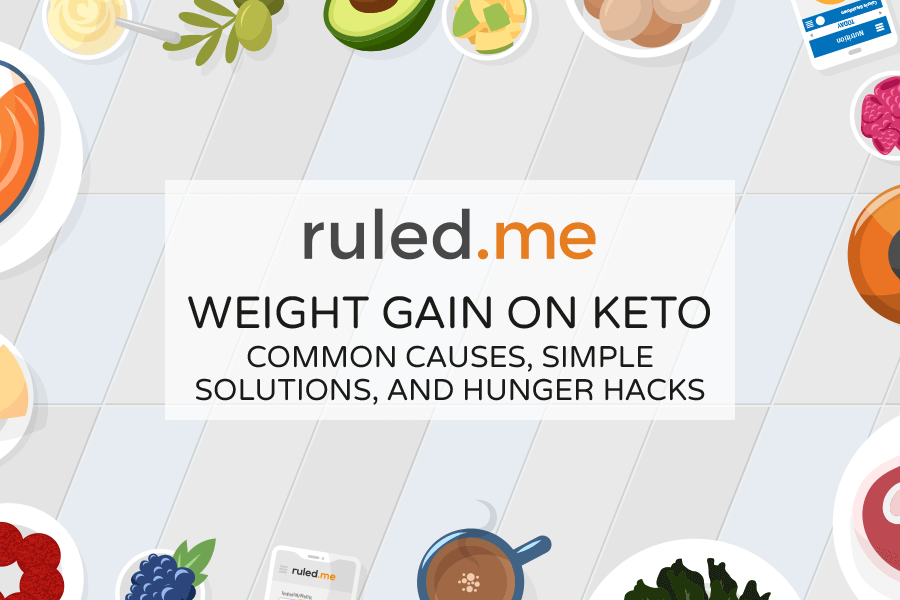
[ad_1]
For most people on keto, weight loss is the easy part. Keeping the weight off, however, is the hard part. The keto diet is often described as the antidote for the vicious cycle of weight loss and weight gain, but it isn’t failproof.
Though keto can indeed suppress appetite and make fat loss easier to achieve, this may not happen for everyone at first. Fortunately, if you’re struggling with hunger or weight gain on keto, a simple lifestyle adjustment is often all it takes to get you back on track to the results you want.
The Secret to Keto Weight Loss Results
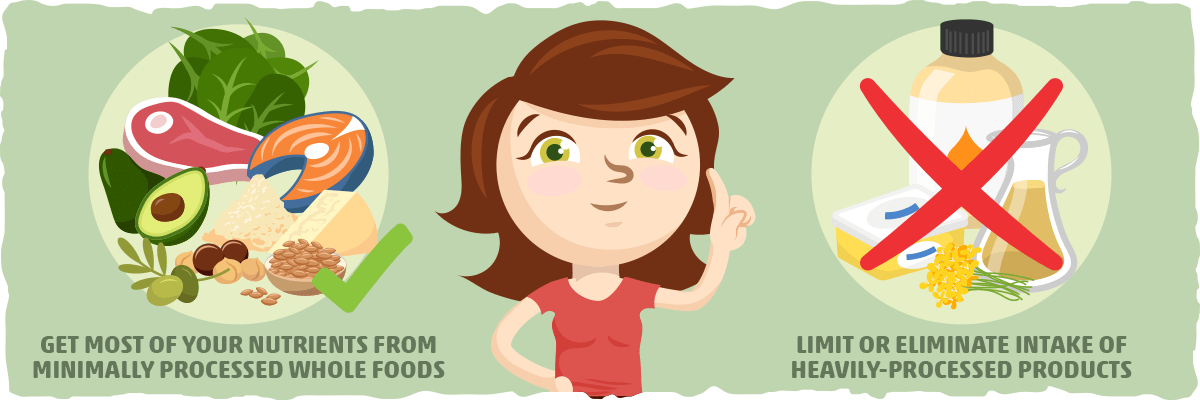
The secret is to get more strict with your keto diet, right? Not necessarily.
In fact, cutting carbs down to zero and chasing the highest ketosis levels are rarely the secret to losing weight and preventing weight gain.
Ironically enough, the secret to getting the weight loss results you want is the same as any other diet (even those that are higher in carbs):
- Get most of your nutrition from minimally processed whole foods.
- Limit your intake of heavily processed products.
By eating in this way, you will feel more satiated while naturally eating fewer calories than before and burning stored body fat.
Though driving your ketone levels higher can help with hunger and weight loss, this should be thought of as the sugar-free icing on the keto-friendly cake, not the cake itself.
Can You Gain Weight on Keto?
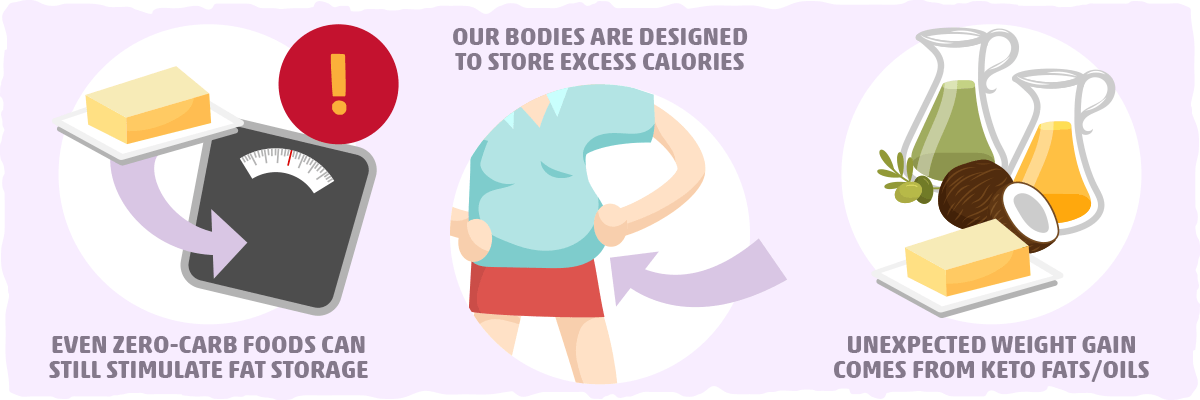
In a literal sense, we can use the keto cake metaphor mentioned above to understand weight gain on keto as well: Even a zero-carb cake can stimulate fat storage if it overloads your body with calories.
Although it can be harder to gain weight when we restrict carbs, it is still possible. This is because our bodies are designed to store any excess calories we eat, so we have sufficient energy to fuel us through a future famine.
This applies to most of the excess fat we eat from keto-friendly foods as well. Rather than letting it go to waste, our body will store it as fat.
In fact, the most common culprit of unexpected weight gain on keto is adding excessive amounts of butter, coconut oil, and other pure fats/oils to meals. Though these are staples in the keto kitchen, they are also surprisingly easy to overconsume.
Why Am I Gaining Weight on Keto? 10 Reasons Why Your Weight Loss Plan Isn’t Working
Whether you hit a plateau or you start seeing the numbers on the scale climb, this doesn’t mean you’ve failed. Even if you’ve struggled with weight loss for decades, you can still lose fat and keep it off.
More often than not, there will be 2 or 3 simple adjustments we need to make to get back on track. To help you figure out why you’re not getting the weight loss results you want, we’ve included the most common keto culprits below.
1. Adding Too Much Pure Fat/Oil to Meals: A Common Cause of Sudden Weight Gain on Keto
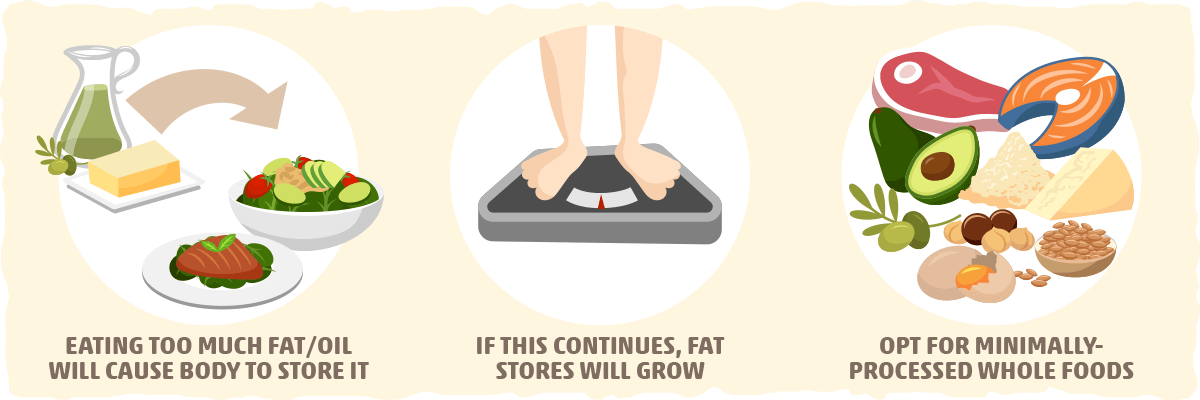
To ensure that you burn your own body fat, it is crucial to consume less energy than your body needs (i.e., maintain a calorie deficit). If you add too much fat to meals, your body will burn that fat and store any excess energy it doesn’t need. As this continues, your body fat stores will grow incrementally.
A quick fix for this is to hold off on the extra butter and oil. Prioritize minimally processed whole foods instead, such as fresh meat/seafood, avocados, full-fat cheese, nuts, seeds, and olives.
These options are packed with much more nutrition than you’d get from pure fats and oils. As a result, you’ll feel more satisfied after eating fewer calories.
If you’d like to take a closer look at your fat intake needs and how to meet them on keto, check out our comprehensive guide on the topic.
2. Overeating High-fat Keto Snacks
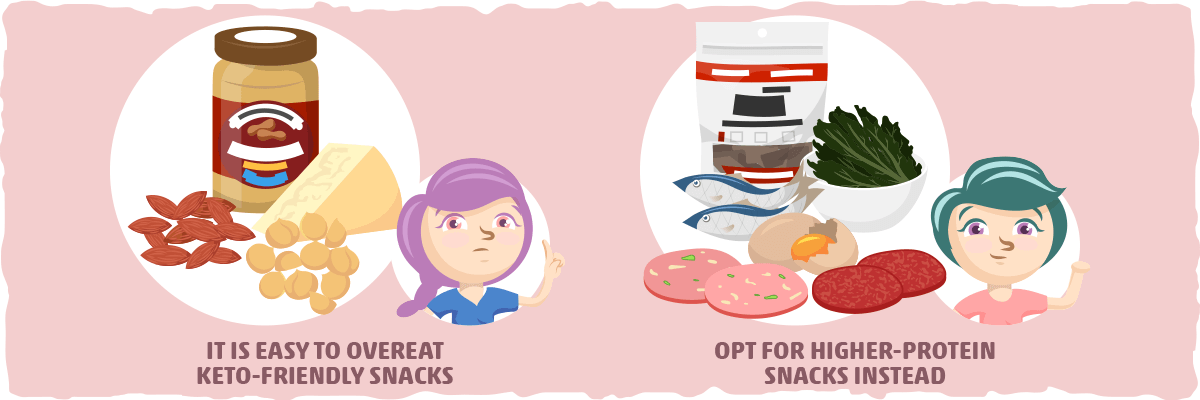
Snacking on keto-friendly foods can be an effective way to prevent hunger between meals. However, it is surprisingly easy to overeat high-fat keto snacks when we don’t portion them properly.
The perfect examples of this are low-carb nuts, nut butter, and full-fat cheese. Though these snacks are healthy in moderation, an extra ounce or two can provide your body with enough fuel to prevent it from dipping into its body fat stores.
If you find over-snacking to be an issue on keto, try opting for lower-calorie and/or higher protein snacks. These tend to be more filling with fewer calories, helping you get through the day without hunger taking over.
Some examples of this include hard-boiled eggs, sugar-free deli meats, beef jerky, sardines, mackerel, pickles, and kale chips. For a complete list of ketosis-boosting snacks, check out our keto snack list.
That being said, it is also helpful to consider why you need a snack to make it through the day. The drive to snack in the afternoon is often caused by a nutritionally inadequate lunch and/or breakfast. It’s usually best to reduce or eliminate your snacking habits by eating well-balanced meals that can keep you full when you’re not eating. Increasing the amount of water you drink can also help tide over hunger between meals as you may just be dehydrated and not actually hungry.
3. Not Eating Enough Nutrient-rich Foods
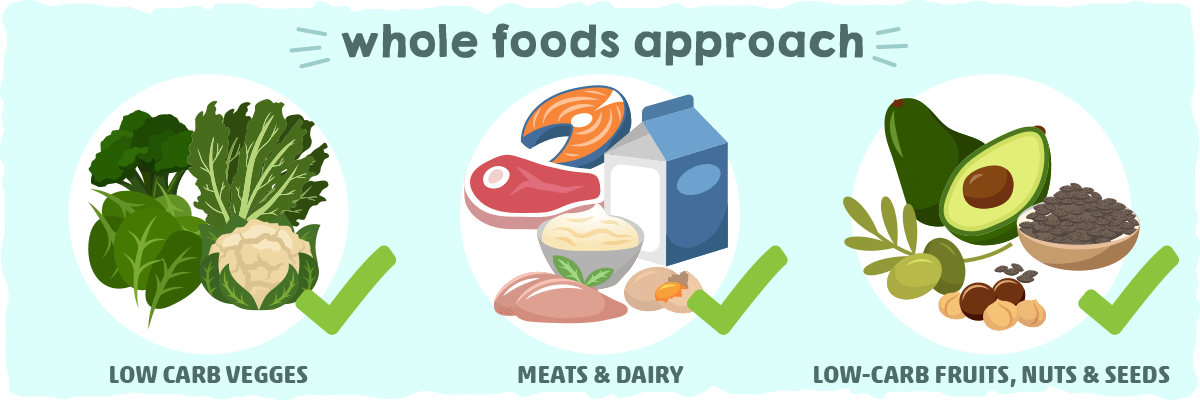
No matter what diet plan you follow, the key to healthy, sustainable weight loss is consuming nutrient-rich whole foods. These include low-carb vegetables, full-fat dairy products, eggs, fish, pastured fatty cuts of meats/poultry, avocado, olives, low-carb nuts, and seeds.
When our meals are composed of these keto foods, we provide our bodies with plenty of healthy fats, protein, fiber, vitamins, minerals, and antioxidants. As a result, we are more satisfied and energized throughout the day without feeling the need to reach for a snack. (This will translate into more sustainable weight loss results in the long run.)
In contrast, if we rely on heavily processed keto ingredients and products as our primary source of fat — such as keto snack bars, low-carb desserts, fat bombs, and added fats/oils — we tend to feel less satiated, experience more hunger, and eat more food than our body needs.
4. Underestimating How Much You Eat
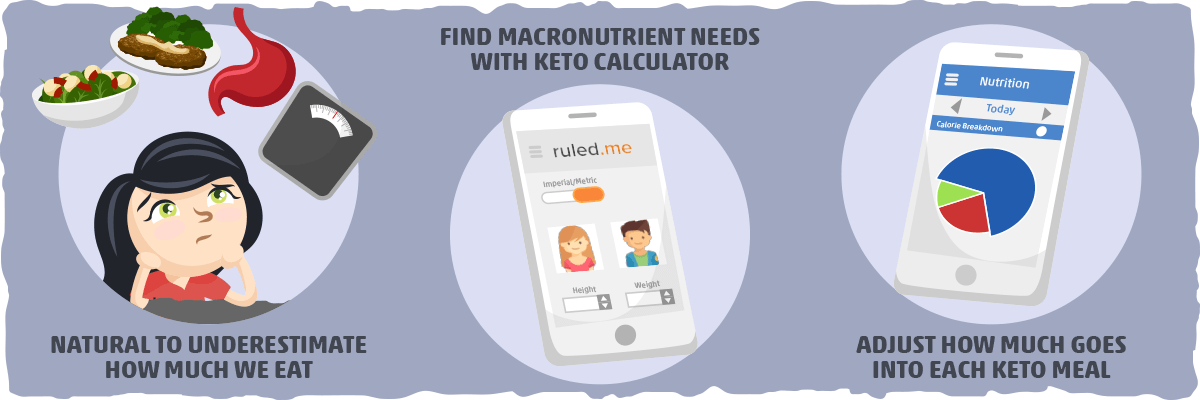
Many of us naturally underestimate how much we eat.
In fact, this is a prevalent cause of arguably the most frustrating part of dieting: When you step on the scale after a month of eating the right foods, only to see that the number increased.
To prevent this from happening, we need to develop a better awareness of how much is too much. The first step to figuring out what “too much” means for you is calculating your macronutrient needs with the keto calculator.
With your macronutrient goals in mind, you’ll be able to adjust how much goes into each keto meal and track your intake until you develop a better sense of what your body needs.
5. Overeating on Cheat Day(s)
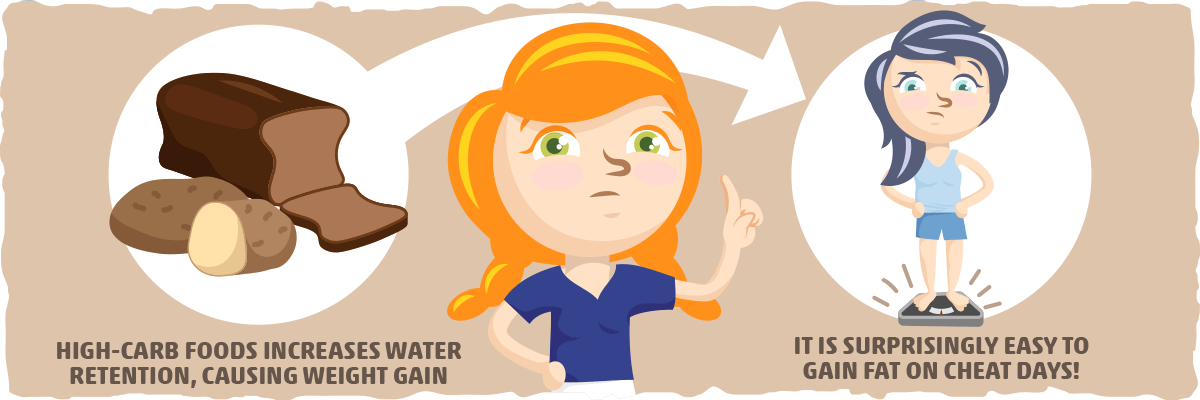
For some, cheat meals can be an effective way of sticking to a keto lifestyle without feeling restricted. Though this means you won’t be in constant ketosis, it can help make weight loss more sustainable in the long run.
That said, there are two huge caveats to keep in mind when adding cheat meals to your keto lifestyle:
- Eating high-carb foods will cause your body to retain more water than it does while eating keto. This can increase the weight on the scale by several pounds.
- It’s surprisingly easy to consume enough calories on a cheat day to gain more fat than you lost throughout the week. This is particularly true if you have a couple of alcoholic beverages with your cheat meal(s).
6. Alcohol Consumption is Getting in the Way
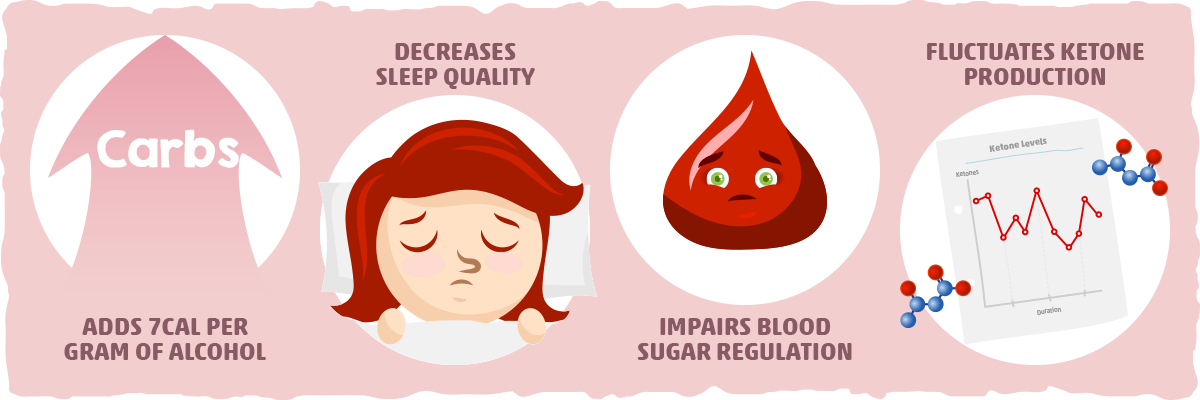
Alcohol intake can impair keto weight loss results in several ways. In fact, the extra carbs you’ll get from alcoholic beverages are less worrisome than the effects of the alcohol itself.
For example, even a zero-carb alcoholic drink will impact your body in the following ways:
- Adds an extra 7 calories per gram of alcohol to your diet
- Decreases overall sleep quality (when consumed within 4 hours of bedtime)
- Impairs blood sugar regulation
- Causes fluctuations in ketone production
Because of this, regular alcohol consumption can make any significant diet change more difficult and impair your weight loss efforts.
Cutting it out completely is generally the healthiest option, but you can still get the results you want with a moderate alcohol intake. In other words, when you do drink, keep alcoholic beverage consumption below two servings per day for men or one serving per day for women. And, of course, make sure those drinks are keto-friendly!
For a comprehensive list of keto options, check out our complete guide to drinking alcohol on keto.
7. Chronic Stress and Poor Sleep Quality are Making Weight Loss Too Difficult
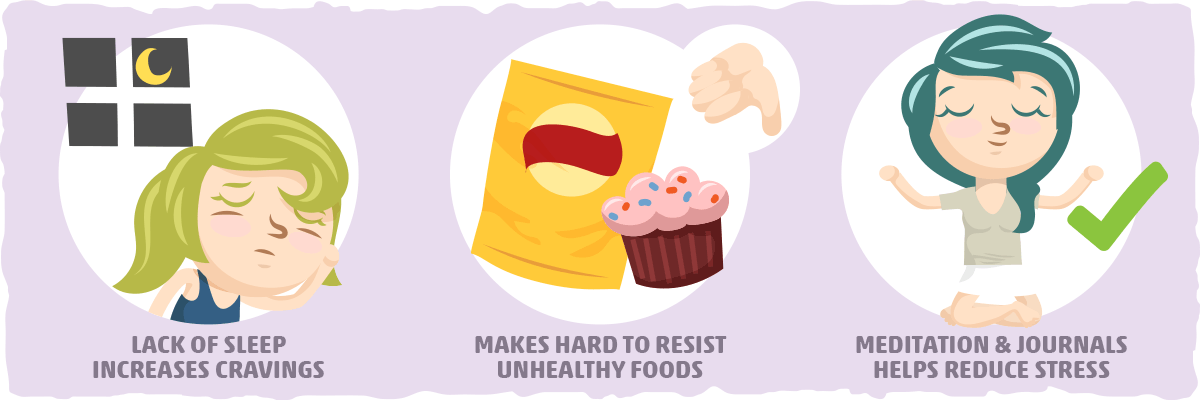
A lack of sleep has been shown to increase appetite and cravings, making it harder to resist and restrict our intake of unhealthy foods. Being under chronic stress can have a similar impact as well.
Furthermore, chronic stress and inadequate sleep can cause our cortisol levels to climb, increasing the likelihood of storing fat around our midsection.
You can lower stress and improve sleep quality at the same time by adding meditation and/or journaling to your bedtime routine. While doing so, make sure you are limiting your exposure to bright lights and electronic devices as well.
Another simple way to improve sleep quality, reduce stress levels and get better weight loss results is to increase your daily activity levels.
8. Dieting Triggered a Decrease in Your Daily Activity Levels
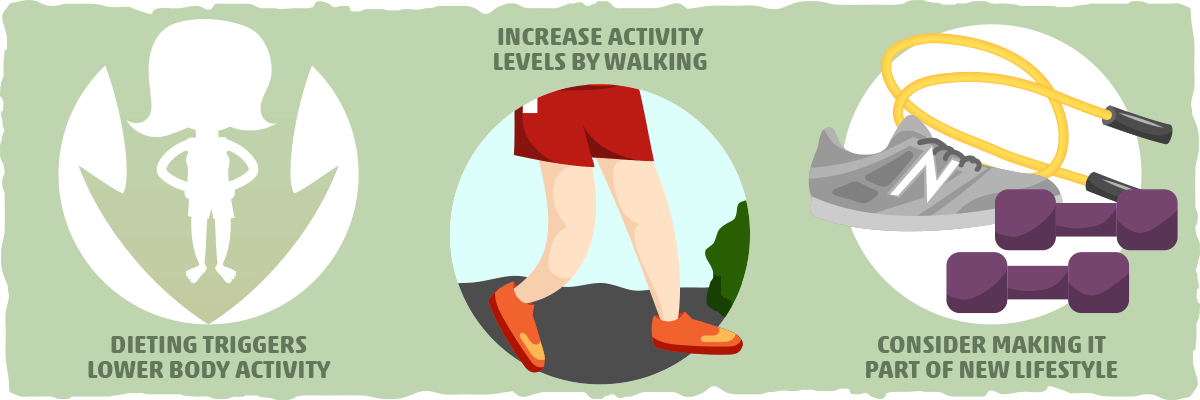
One fascinating finding in the weight loss literature is that many of us will subconsciously reduce how much we move throughout the day while dieting.
This is thought to be your body’s natural energy-conserving mechanism, which is triggered whenever food is limited. As a result, we end up burning less energy throughout the day, making it easier to overeat and gain fat.
To counteract this, we must make a conscious effort to move more throughout the day. However, this doesn’t mean you have to force yourself to go to the gym every day.
In fact, going for a morning or evening walk, gardening, hiking, and/or using a treadmill desk is enough to increase your activity levels significantly.
Once this becomes a part of your keto lifestyle, consider adding resistance training, yoga, a workout class, or cardio workouts to your weekly routine a few times a week.
9. Eating Too Many Carbs
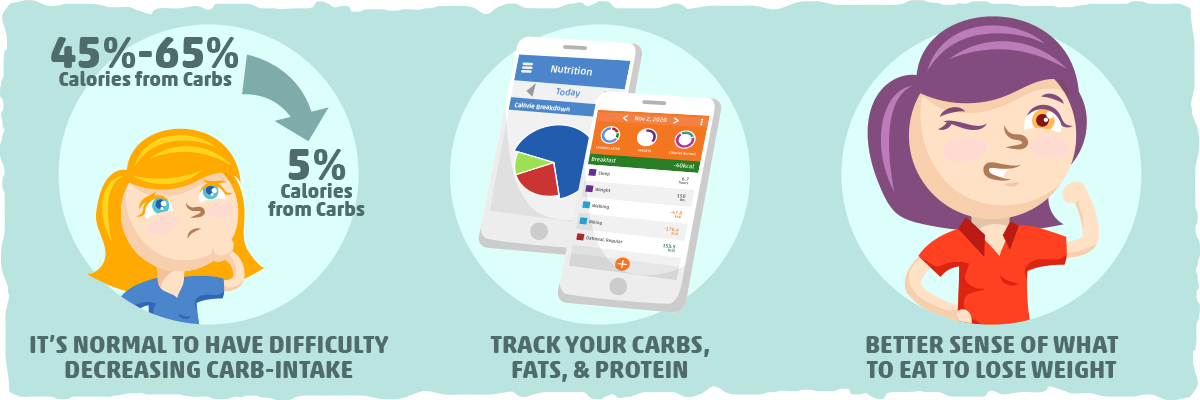
Since typical diets contain 45–65% of calories from carbs, decreasing that intake down to 5% for ketosis is a rather steep drop. It’s normal to have difficulty cutting out carbs when first adjusting to the ketogenic diet.
To help you reach your keto intake goals, consider tracking your carb, fat, and protein intake with an app like MyFitnessPal, Cronometer, or Carb Manager. After 1-2 months of doing this, you’ll develop a better sense of what you need to eat to lose weight and promote ketosis.
If you’d like to learn more about tracking carbs on keto, we’ve created a comprehensive guide that’ll help you get started.
10. A Certain Medication or Health Condition might be the Underlying Cause
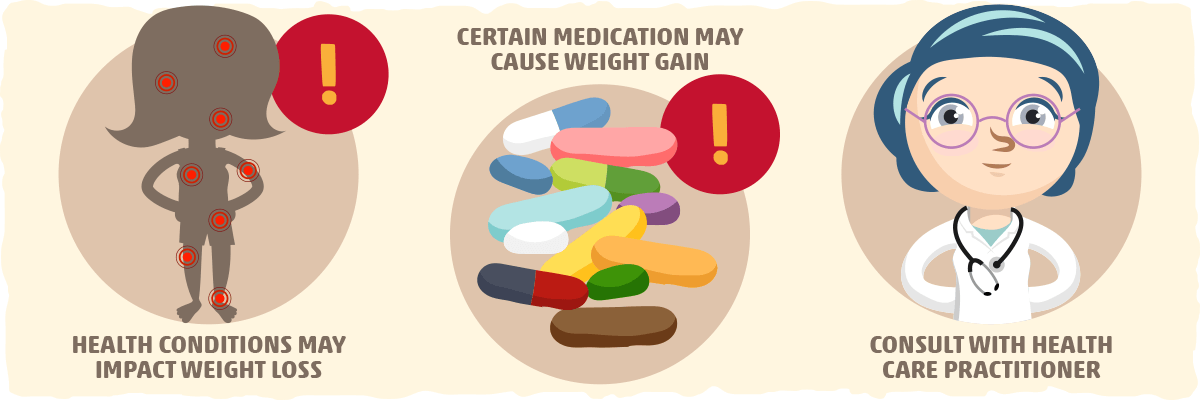
If you’re having a hard time losing weight even after doing everything right, it’s a good idea to rule out any medical issues that may be preventing weight loss success.
Hypothyroidism, polycystic ovarian syndrome (PCOS), Cushing’s syndrome, and depression, for example, are some conditions associated with weight gain and difficulty losing weight. Your doctor can rule out these conditions with a series of tests.
Certain medications can cause weight gain or make it difficult to lose weight as well. If you recently started a new medication, make sure to check for side effects that may impact your weight (i.e., slowed metabolism, greater fluid retention, increased appetite, or increased body fat storage).
That said, regardless of what condition you have or medication you take, it is still possible to improve your health and body composition. By consulting with your health care practitioner and fine-tuning your approach, you’ll be able to figure out what works best for you.
What About Weight Regain on Keto? Why We Struggle to Keep the Weight Off
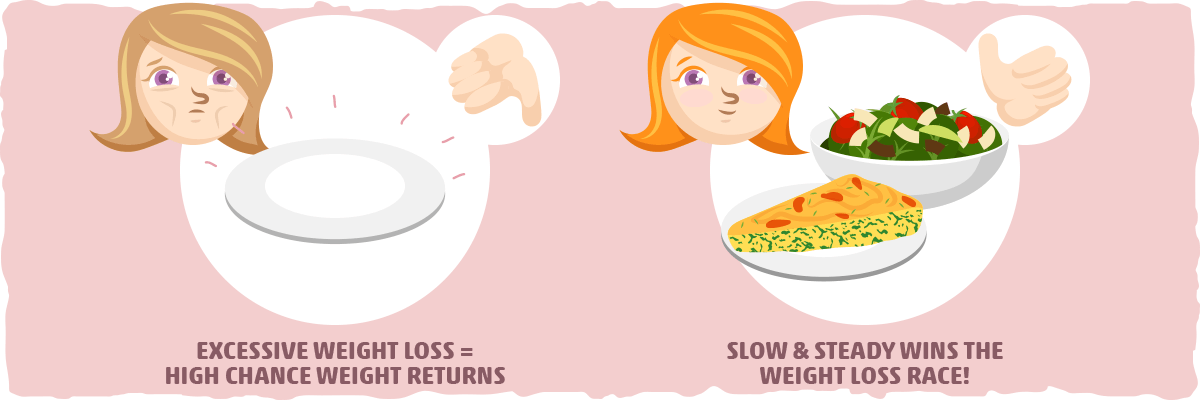
Slow and steady will win the weight loss race.
Though eating fewer calories than our body needs is necessary for weight loss, this doesn’t mean we should aim for the biggest calorie deficit possible.
In fact, our bodies have developed several mechanisms to prevent excessive weight loss when calories are limited, including decreasing how much energy you burn and driving up your hunger and stress hormone levels.
When we rely on severe calorie restriction, we still lose weight, but more of it will come from muscle mass than we’d like. Altogether, this results in a “skinny fat” body composition that burns much less energy than before and a deprived brain that responds by increasing your appetite substantially.
More often than not, these factors overcome our best weight loss efforts, eventually causing us to eat more and gain the weight back.
To break the cycle of weight loss and regain, try aiming for a gentle calorie deficit that promotes a weight loss rate of 1 to 2 pounds per week. A 10-20% caloric deficit tends to the sweet spot for this.
What If You’re Still Hungry on Keto? How to Keep Cravings Under Control
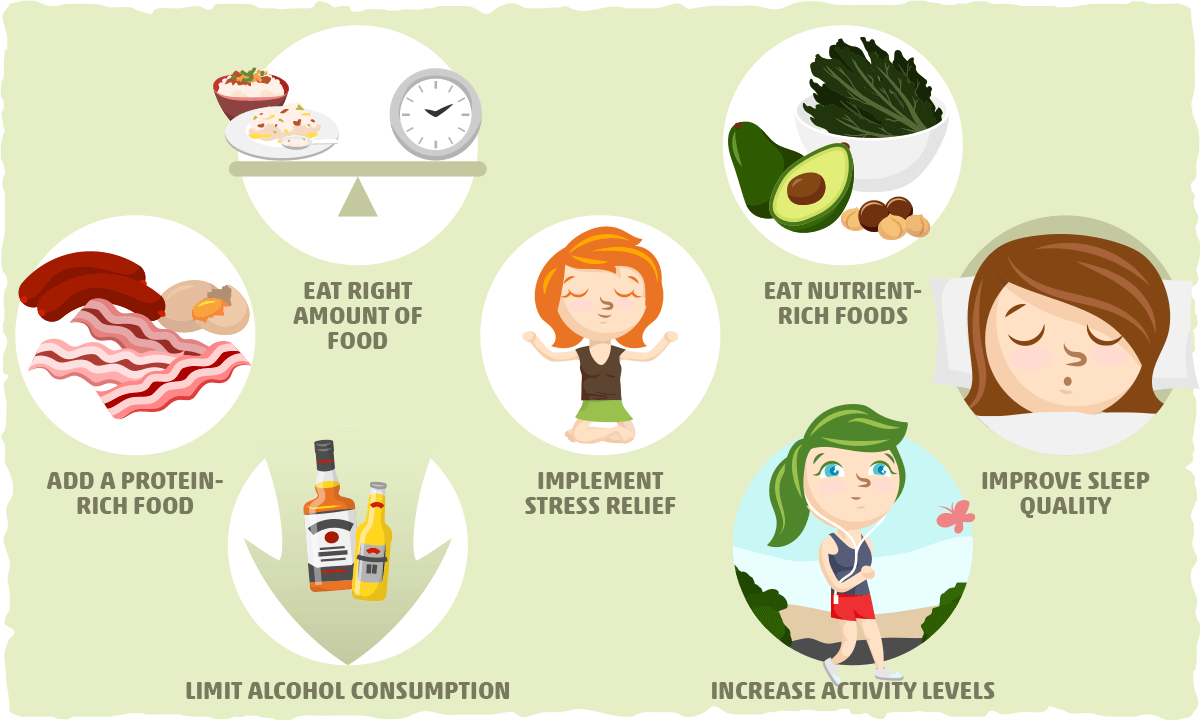
Hunger is a complex phenomenon that can be influenced by a wide variety of lifestyle factors. In fact, several of the common culprits behind weight gain on keto can drive hunger as well.
Here are some of the most effective solutions for hunger on keto:
- Eat the right amount of food. In earlier sections, we emphasized how eating too much fat can cause weight gain on keto, but this doesn’t mean we should severely restrict food consumption. This approach will drive substantially more hunger than if you strive for a slow and steady weight loss rate.
- Eat more nutrient-rich foods. In other words, get most of your fat and protein from minimally processed keto-friendly whole foods. Check out our keto food list for options, ideas, and inspiration.
- Add a protein-rich food to each meal. Protein intake helps suppress hunger and curb cravings. By implementing the two hunger hacks above, you will likely have enough protein with each meal. That said, if your hunger is still out of control, it may be helpful to focus on getting the right amount of protein daily. To find out what this means for you, use our keto calculator.
- Implement stress-relieving practices. Chronic stress can drive hunger and greatly reduce your ability to resist cravings. One of the best stress-relieving practices is maximizing sleep quality. A simple way to do that is by meditating and/or journaling 30 minutes before your ideal bedtime or getting adequate physical activity.
- Improve your sleep quality. A lack of sleep is a major driver of hunger, cravings, and subsequent weight gain. Prioritizing sleep quality is a secret weapon to making any diet easier. You can enhance your sleep quality tonight by stopping food and alcohol intake at least 3-4 hours before bed and increasing your activity levels throughout the day.
- Limit your alcohol consumption. Due to its impact on blood sugar, ketosis, and sleep quality, alcoholic beverages can increase hunger and cravings. This is why we often reach for high-fat, high-carb foods like fries, pizza, and ice cream when we are drunk or hungover.
- Increase activity levels. Aerobic activities, such as walking, cycling, and jogging, can help curb your appetite. This is also a great way to promote fat-burning and ketone production, particularly when you start your morning off with a brisk walk (or any other preferred form of exercise).
This list represents the keto lifestyle factors that will have the biggest impact on your hunger and cravings. By addressing them throughout your diet plan, you will significantly increase your chances of long-term, sustainable weight loss results.
Quick Keto Hunger Hacks
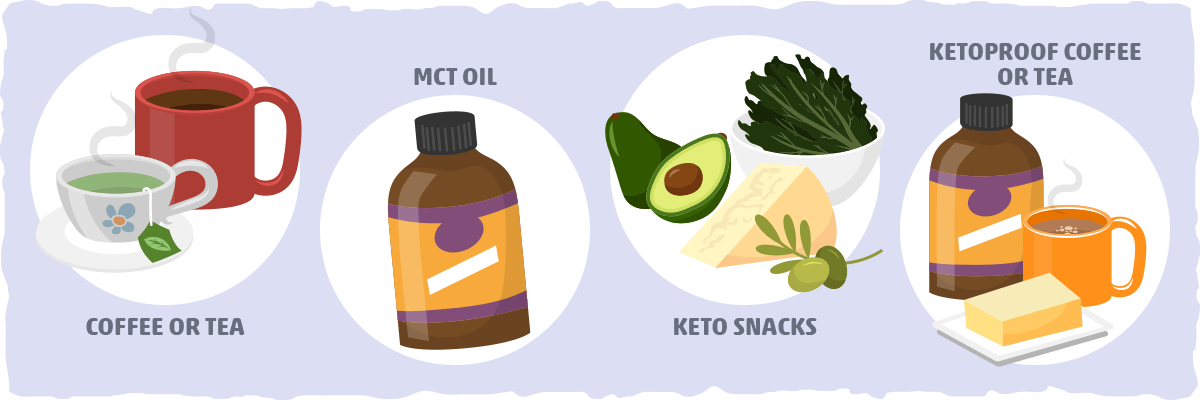
That being said, what should you do if you are struck with a craving or hunger pang that is suspiciously hard to resist? Try one of the following keto-friendly hunger hacks:
- Coffee/Tea — Black coffee, green tea, and black tea contain ketosis-boosting caffeine and phytocompounds that can help decrease appetite. Altogether, these qualities increase energy levels and reduce hunger. (Note: Caffeine consumption will impair sleep quality when consumed within 6 hours of bedtime.)
- MCT oil — Of the primary fats you’ll eat on keto, MCTs have been found to increase ketone levels and feeling of fullness the most. Blending some MCT oil into your morning coffee or incorporating it into keto snacks/meals can help control hunger and boost energy levels. To learn more about MCTs, what to buy, and how to use them on keto, check out our guide to MCT oil.
- Keto snacks — What should you do when an unhealthy food item ignites an intense craving? Use a tasty keto snack with similar textures and flavors to extinguish that fire. Browse through our keto snack list to find the perfect option for your specific craving. Just make sure it fits within your daily keto macros as well.
- Ketoproof coffee or tea (Combining the three hunger hacks) — One of the best ways to fight those late-morning or early afternoon hunger pangs is by adding MCTs and other healthy fats to your morning coffee. This will provide you with the benefits of caffeine, the health-promoting compounds in coffee/tea, MCTs, and a high-fat keto snack, all in one delicious morning beverage. To learn how to make it, click here for a ketoproof coffee recipe and here for ketoproof tea.
Common Keto Weight Gain Myths: Carbs, Protein, and Ketosis
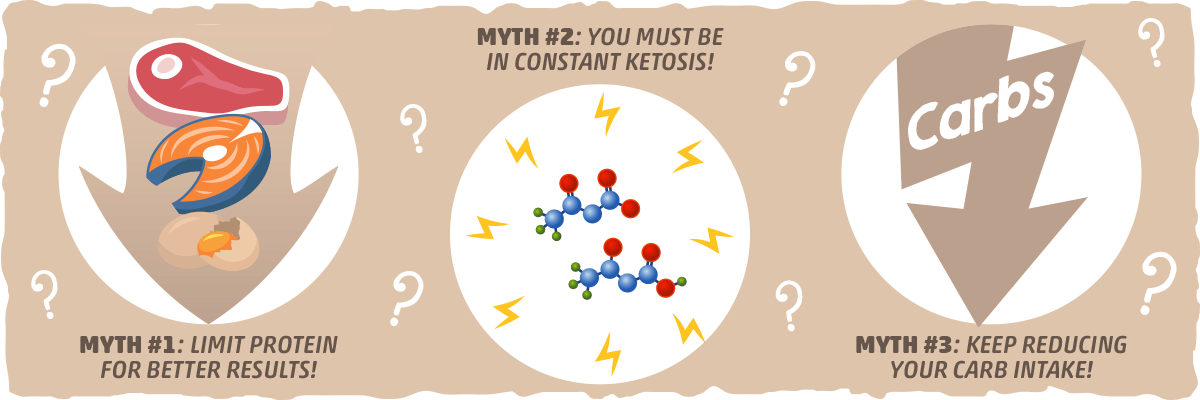
Before putting everything together into a personalized keto plan, there are a few keto myths we must address. You’ll often find these myths being emphasized as common keto weight gain culprits.
Though rigidly focusing on them can lead to short-term weight loss, they simultaneously make those results less sustainable and increase the likelihood of gaining all of the weight back.
Myth #1: Limit your protein intake for better results.
Though it is true that overeating protein can impact ketosis and weight loss results, we often underestimate how much protein is required for this to happen. In reality, most of us won’t come close to a protein intake that impairs our results.
Furthermore, by limiting protein intake, we only make dieting and weight loss harder to maintain. This is because protein is essential for curbing cravings, satisfying our appetite, and preventing muscle loss.
For a quick estimate of how much protein you need on keto, use our keto calculator.
Myth #2: You must be in constant ketosis to lose fat and prevent weight gain.
Though being in ketosis is the hallmark of keto, this doesn’t mean you have to be in deeper ketosis to lose weight and keep it off.
Ultimately, the most important factor behind getting the results you want is formulating a healthy diet that you can turn into a sustainable lifestyle.
For some, following a strict keto diet will do the trick. For others, experimenting with different low-carb or keto variations may be necessary before finding a way of eating that works well for them.
Myth #3: Keep reducing your carb intake.
Getting carbs as low as possible is not necessary for keto weight loss results.
Once you get to a carb limit that helps you maintain ketosis, there is no need to push your intake lower and lower. This can put excess stress on your body and make your diet unnecessarily hard to follow.
If your carb intake is already low enough and you’re still struggling with hunger or weight gain, apply one or two of the keto diet tips described in previous sections instead. Typically, the most effective strategy for both hunger and weight gain is to replace pure fats/oils with low-carb whole foods.
For example, instead of relying on olive oil, coconut oil, and butter to get most of your fat, think of these fats/oils as a garnish. Get most of your fat from fatty cuts of meat, fish, eggs, cheese, and other minimally-processed keto-friendly foods.
The Bigger Picture: Weight Gain, Hunger, and Bulletproofing Your Keto Weight Loss Results
There is no secret to preventing weight gain, curbing hunger, and maintaining your weight loss results. Chasing higher levels of ketosis, zero-carb eating, and keto fat loss supplements will only make your keto diet less sustainable in the long run.
To get the results you want, you must address the lifestyle factors that are getting in the way. The most common examples of this include:
- Adding too much fat/oil to meals
- Not eating enough nutrient-rich foods
- Snacking on high-fat snacks without being mindful of portion sizes
- Overeating on cheat day(s)
- Drinking too much alcohol
- Neglecting the importance of stress relief and optimizing sleep quality
- Being less physically active than usual
- Eating too many carbs
- Severely limiting your calorie intake
If you’re still hungry on keto or experiencing unexpected weight gain, these tend to be the most common triggers.
That said, rather than overwhelming yourself with the impossible task of addressing multiple culprits at once, focus on one at a time. Start with the easiest option for your lifestyle and build off of that momentum.
As you continue to make small changes, you’ll naturally begin to formulate a healthy keto lifestyle that helps you maintain your weight loss results for life.
If you’d like to see more tips, strategies, and tools to make this happen, we’ve included several resources below:
Sources
[ad_2]
Source link


